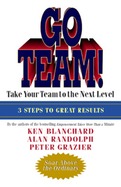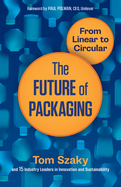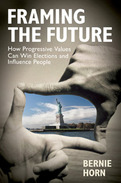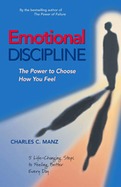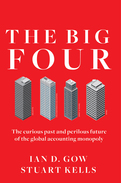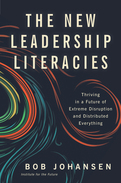2007
Designed as a working guide filled with detailed instructions for people who want to build high performing teams, Go Team! will lead you, step by step, to great results.
Through discussions, case examples, and questions to consider, you and your teammates will learn how to share information to build high levels of trust and responsibility; set clear boundaries to create the freedom for team members to act responsibly; and develop self-managing skills to make good team decisions. With Go Team! as a guide, you'll find that working in a team can be fun, satisfying, and highly productive.
- Coauthored by Ken Blanchard, coauthor of The One Minute Manager and numerous other international bestsellers
- Provides a guided, 3-step process for turning a group of people into a Next-Level Team that can and does achieve great results
- Includes many case examples of teams that have become Next-Level Teams
Tom Szaky sets out to do the impossible – eliminate all waste. This book paints a future of a “circular economy” that relies on responsible reuse and recycling to propel the world towards eradicating overconsumption and waste.
Only 35 percent of the 240 million metric tons of waste generated in the United States alone gets recycled, according to the Environmental Protection Agency. This extraordinary collection shows how manufacturers can move from a one-way take-make-waste economy that is burying the world in waste to a circular, make-use-recycle economy.
Steered by Tom Szaky, recycling pioneer, eco-capitalist, and founder and CEO of TerraCycle, each chapter is coauthored by an expert in his or her field. From the distinct perspectives of government leaders, consumer packaged goods companies, waste management firms, and more, the book explores current issues of production and consumption, practical steps for improving packaging and reducing waste today, and big ideas and concepts that can be carried forward.
Intended to help every business from a small start-up to a large established consumer product company, this book serves as a source of knowledge and inspiration. The message from these pioneers is not to scale back but to innovate upward. They offer nothing less than a guide to designing ourselves out of waste and into abundance.
2008
Polls consistently show that most Americans are progressives at heart. By margins of at least two to one, we favor affordable healthcare for all, even if it means raising taxes; want federal action to combat global warming; support stricter gun control; don’t want Roe vs. Wade overturned; and the list goes on. So why is it so hard for progressive candidates to win elections?
Because, says Bernie Horn, most progressives don’t know how to explain their ideas in ways that resonate with “persuadables”—the significant slice of the electorate who don’t instantly identify as Democrats or Republicans. These are the voters who swing elections. There’s been a lot of theoretical discussion about framing lately, but Framing the Future isn’t theory—the concepts outlined have been used successfully by progressive candidates across the nation, even in such conservative bastions as Montana, Arizona, and Florida.
Drawing on rigorous polling data and his own experience as a veteran political consultant, Horn explains how persuadable voters think about issues and make political decisions and why, as a result, the usual progressive approaches are practically designed to fail with them. He offers a crash course in the nuts and bolts of framing and shows how to use three bedrock American values—freedom, opportunity, and security—to frame progressive positions in a way that creates a consistent, unified political vision that will appeal to persuadable voters. He even offers advice on specific words and phrases to use when talking about a variety of issues and ideas.
2003
• Winner of the Gold Award for the Self-Help Category for the 2003 ForeWord Magazine Book of the Year Awards
• Includes a life-changing five-step process for assessing and managing key factors in the mind, body, emotions, and spirit that shape how we feel
• Debunks the idea that how we feel is beyond our personal influence and shows that, on the contrary, we can choose how we feel every day
• By the author of The Power of Failure and The Leadership Wisdom of Jesus
2018
With staffs that are collectively larger than the Russian army and combined revenues of over $130 billion a year, the Big Four accounting firms—Deloitte, PricewaterhouseCoopers, Ernst & Young, and KPMG—are a keystone of global commerce. But leading scholar Ian Gow and award-winning author Stuart Kells warn that a house of cards may be about to fall.
Stretching back to the Medicis in Renaissance Florence, this book is a fascinating story of wealth, power, and luck. The founders of the Big Four lived surprisingly colorful lives. Samuel Price, for example, married his own niece. Between the world wars, Nicholas Waterhouse collected postage stamps while also hosting decadent parties in his fashionable London home.
All four firms have endured major calamities in recent decades. There have been hundreds of court cases and legal prosecutions for failed audits, tax scandals, and breaches of independence. The firms have come so close to “extinction level events” that regulators have required them to prepare “living wills.” And today, the Big Four face an uncertain future—thanks to their push into China, their vulnerability to digital disruption and competition, and the hazards of providing traditional services in a new era of transparency.
This account of the past, present, and likely future of the Big Four is essential reading for anyone perplexed or fascinated by professional services, working or considering working in the industry, or simply curious about the fate of the global economy.
It's too late to catch up, but it's a great time to leapfrog. Noted futurist Bob Johansen goes beyond skills and competencies to propose five new leadership literacies—combinations of disciplines, practices, and worldviews—that will be needed to thrive in a VUCA world of increasing volatility, uncertainty, complexity, and ambiguity. This book shows how to (1) forecast likely futures so you can “look back” and make sure you're prepared now for the changes to come, (2) use low-risk gaming spaces to work through your concerns about the future and hone your leadership skills, (3) lead shape-shifting organizations where you can't just tell people what to do, (4) be a dynamic presence even when you're not there in person, and (5) keep your personal energy high and transmit that energy throughout your organization.
This visionary book provides a vivid description of the ideal talent profile for future leaders. It is written for current, rising star, and aspiring leaders; talent scouts searching for leaders; and executive coaches seeking a fresh view of how leaders will need to prepare. To get ready for this future, we will all need new leadership literacies.


